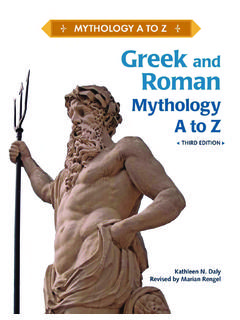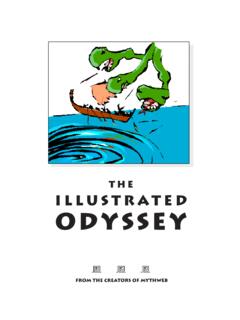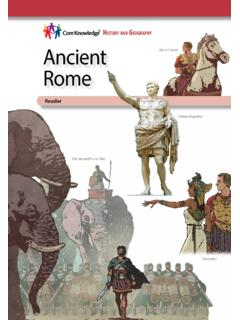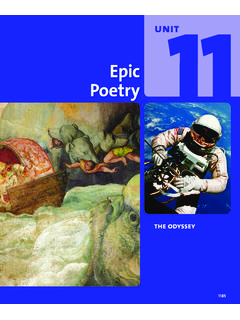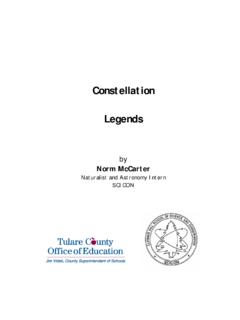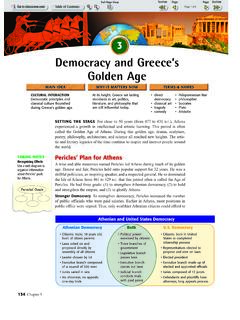Transcription of Begin Reading - Monastic Order of Knights
1 Begin ReadingTable of ContentsNewslettersCopyright PageIn accordance with the Copyright Act of 1976, the scanning, uploading, and electronic sharing ofany part of this book without the permission of the publisher constitute unlawful piracy and theft of theauthor s intellectual property. If you would like to use material from the book (other than for reviewpurposes), prior written permission must be obtained by contacting the publisher Thank you for your support of the author s book on Mythology must draw from widely different sources. Twelvehundred years separate the first writers through whom the myths have comedown to us from the last, and there are stories as unlike each other as Cinderella and King Lear. To bring them all together in one volume isreally somewhat comparable to doing the same for the stories of Englishliterature from Chaucer to the ballads, through Shakespeare and Marlowe andSwift and Defoe and Dryden and Pope and so on, ending with, say, Tennysonand Browning, or even, to make the comparison truer, Kipling andGalsworthy.
2 The English collection would be bigger, but it would not containmore dissimilar material. In point of fact, Chaucer is more like Galsworthyand the ballads like Kipling than Homer is like Lucian or Aeschylus with this problem, I determined at the outset to dismiss any idea ofunifying the tales. That would have meant either writing King Lear, so tospeak, down to the level of Cinderella the vice versa procedure beingobviously not possible or else telling in my own way stories which were inno sense mine and had been told by great writers in ways they thought suitedtheir subjects. I do not mean, of course, that a great writer s style can bereproduced or that I should dream of attempting such a feat. My aim has beennothing more ambitious than to keep distinct for the reader the very differentwriters from whom our knowledge of the myths comes. For example, Hesiodis a notably simple writer and devout; he is na ve, even childish, sometimescrude, always full of piety. Many of the stories in this book are told only byhim.
3 Side by side with them are stories told only by Ovid, subtle, polished,artificial, self-conscious, and the complete skeptic. My effort has been tomake the reader see some difference between writers who were so all, when one takes up a book like this, one does not ask howentertainingly the author has retold the stories , but how close he has broughtthe reader to the hope is that those who do not know the classics will gain in this waynot only a knowledge of the myths, but some little idea of what the writerswere like who told them who have been proved, by two thousand years andmore, to be to Classical MythologyOf old the Hellenic race was marked off from the barbarian as morekeen-witted and more free from I: and Roman mythology is quite generally supposed to show us theway the human race thought and felt untold ages ago. Through it, according tothis view, we can retrace the path from civilized man who lives so far fromnature, to man who lived in close companionship with nature; and the realinterest of the myths is that they lead us back to a time when the world wasyoung and people had a connection with the earth, with trees and seas andflowers and hills, unlike anything we ourselves can feel.
4 When the storieswere being shaped, we are given to understand, little distinction had as yetbeen made between the real and the unreal. The imagination was vividly aliveand not checked by the reason, so that anyone in the woods might see throughthe trees a fleeing nymph, or bending over a clear pool to drink, behold in thedepths a naiad s prospect of traveling back to this delightful state of things is held outby nearly every writer who touches upon classical mythology, above all bythe poets. In that infinitely remote time primitive man couldHave sight of Proteus rising from the sea;Or hear old Triton blow his wreath d we for a moment can catch, through the myths he made, a glimpse of thatstrangely and beautifully animated a very brief consideration of the ways of uncivilized peopleseverywhere and in all ages is enough to prick that romantic bubble. Nothing isclearer than the fact that primitive man, whether in New Guinea today or eonsago in the prehistoric wilderness, is not and never has been a creature whopeoples his world with bright fancies and lovely visions.
5 Horrors lurked in theprimeval forest, not nymphs and naiads. Terror lived there, with its closeattendant, Magic, and its most common defense, Human Sacrifice. Mankind schief hope of escaping the wrath of whatever divinities were then abroad layin some magical rite, senseless but powerful, or in some offering made at thecost of pain and MYTHOLOGY OF THE GREEKSThis dark picture is worlds apart from the stories of classical mythology. Thestudy of the way early man looked at his surroundings does not get much helpfrom the Greeks. How briefly the anthropologists treat the greek myths course the Greeks too had their roots in the primeval slime. Of coursethey too once lived a savage life, ugly and brutal. But what the myths show ishow high they had risen above the ancient filth and fierceness by the time wehave any knowledge of them. Only a few traces of that time are to be found inthe do not know when these stories were first told in their present shape;but whenever it was, primitive life had been left far behind.
6 The myths as wehave them are the creation of great poets. The first written record of Greece isthe Iliad. greek mythology begins with Homer, generally believed to be notearlier than a thousand years before Christ. The Iliad is, or contains, the oldestGreek literature; and it is written in a rich and subtle and beautiful languagewhich must have had behind it centuries when men were striving to expressthemselves with clarity and beauty, an indisputable proof of civilization. Thetales of greek mythology do not throw any clear light upon what earlymankind was like. They do throw an abundance of light upon what earlyGreeks were like a matter, it would seem, of more importance to us, who aretheir descendants intellectually, artistically, and politically, too. Nothing welearn about them is alien to often speak of the greek miracle. What the phrase tries toexpress is the new birth of the world with the awakening of Greece. Oldthings are passed away; behold, all things are become new. Something likethat happened in Greeks, unlike the Egyptians, made their gods in their own it happened, or when, we have no idea at all.
7 We know only that inthe earliest greek poets a new point of view dawned, never dreamed of in theworld before them, but never to leave the world after them. With the comingforward of Greece, mankind became the center of the universe, the mostimportant thing in it. This was a revolution in thought. Human beings hadcounted for little heretofore. In Greece man first realized what mankind Greeks made their gods in their own image. That had not entered themind of man before. Until then, gods had had no semblance of reality. Theywere unlike all living things. In Egypt, a towering colossus, immobile, beyondthe power of the imagination to endow with movement, as fixed in the stoneas the tremendous temple columns, a representation of the human shapedeliberately made unhuman. Or a rigid figure, a woman with a cat s headsuggesting inflexible, inhuman cruelty. Or a monstrous mysterious sphinx,aloof from all that lives. In Mesopotamia, bas-reliefs of bestial shapes unlikeany beast ever known, men with birds heads and lions with bulls heads andboth with eagles wings, creations of artists who were intent upon producingsomething never seen except in their own minds, the very consummation and their like were what the pre- greek world worshiped.
8 One needonly place beside them in imagination any greek statue of a god, so normaland natural with all its beauty, to perceive what a new idea had come into theworld. With its coming, the universe became Paul said the invisible must be understood by the visible. That wasnot a Hebrew idea, it was greek . In Greece alone in the ancient world peoplewere preoccupied with the visible; they were finding the satisfaction of theirdesires in what was actually in the world around them. The sculptor watchedthe athletes contending in the games and he felt that nothing he could imaginewould be as beautiful as those strong young bodies. So he made his statue ofApollo. The storyteller found Hermes among the people he passed in thestreet. He saw the god like a young man at the age when youth is loveliest, as Homer says. greek artists and poets realized how splendid a man could be,straight and swift and strong. He was the fulfillment of their search for had no wish to create some fantasy shaped in their own minds.
9 All theart and all the thought of Greece centered in human gods naturally made heaven a pleasantly familiar place. TheGreeks felt at home in it. They knew just what the divine inhabitants didthere, what they ate and drank and where they banqueted and how theyamused themselves. Of course they were to be feared; they were verypowerful and very dangerous when angry. Still, with proper care a man couldbe quite fairly at ease with them. He was even perfectly free to laugh at , trying to hide his love affairs from his wife and invariably shown up,was a capital figure of fun. The Greeks enjoyed him and liked him all thebetter for it. Hera was that stock character of comedy, the typical jealous wife,and her ingenious tricks to discomfit her husband and punish her rival, farfrom displeasing the Greeks, entertained them as much as Hera s moderncounterpart does us today. Such stories made for a friendly feeling. Laughterin the presence of an Egyptian sphinx or an Assyrian bird-beast wasinconceivable; but it was perfectly natural in Olympus, and it made the earth, too, the deities were exceedingly and humanly attractive.
10 In theform of lovely youths and maidens they peopled the woodland, the forest, therivers, the sea, in harmony with the fair earth and the bright is the miracle of greek mythology a humanized world, men freedfrom the paralyzing fear of an omnipotent Unknown. The terrifyingincomprehensibilities which were worshiped elsewhere, and the fearsomespirits with which earth, air, and sea swarmed, were banned from Greece. Itmay seem odd to say that the men who made the myths disliked the irrationaland had a love for facts; but it is true, no matter how wildly fantastic some ofthe stories are. Anyone who reads them with attention discovers that even themost nonsensical take place in a world which is essentially rational andmatter-of-fact. Hercules, whose life was one long combat againstpreposterous monsters, is always said to have had his home in the city ofThebes. The exact spot where Aphrodite was born of the foam could bevisited by any ancient tourist; it was just offshore from the island of winged steed Pegasus, after skimming the air all day, went every night toa comfortable stable in Corinth.

